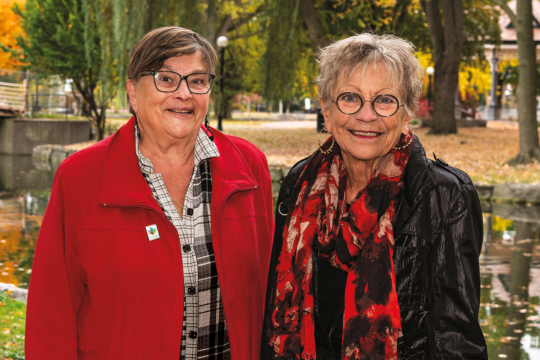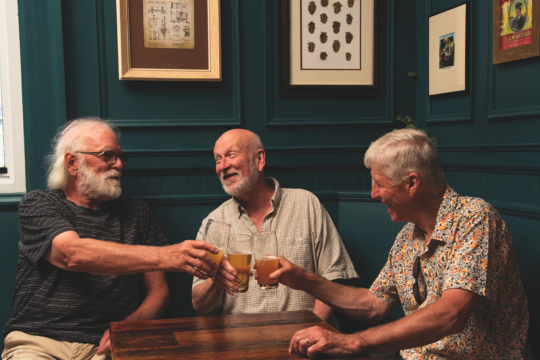
Carol Grieco, left, and Kathy Manzo have been friends since 1973 when they met on the job in Kitchener. They’ve seen each other through life’s ups and downs, including deaths of loved ones, surgeries and disease diagnoses. Photo: Brian Thompson
Carol Grieco can’t imagine her life without her best friend, Kathy Manzo.
“She has just been a godsend to me,” says Grieco, who lives in Kitchener, Ont. “She’s like the sister I chose. I have four great sisters, but they all live in Kingston and she’s my sister [in Kitchener].”
The two have been friends since 1973 and have seen each other through life’s ups and downs. Now they live in the same-sized unit of the same apartment building, just one floor apart.
“She and her husband live on the fifth floor and I live on the fourth,” Grieco says. “We go back and forth to each other’s places and we do stuff together. During the pandemic, I was in their bubble.”
The pandemic — when some people, particularly seniors, went days and weeks without seeing another person except on a screen — certainly drove home the value of friendship. Science does, too. A study published in The American Journal of Psychiatry found that people who have friends and close confidantes are less likely to suffer from depression and are generally happier with their lives. Another study, published in PLOS Medicine, found that they are also less likely to die from all causes, including heart disease and several chronic diseases.
Engagement is important as we age
“As you age, if you look at mental and physical health, there’s no doubt engagement with family, friends, neighbours and even acquaintances is important,” says Simon B. Sherry, a professor in the department of psychology and neuroscience at Dalhousie University. “It’s useful to have a few close humans around you and those are less abundant than ever before.”
He says a U.S. Surgeon General study looking at the epidemic of loneliness found that between 2003 and early 2020, there was a precipitous drop in the amount of time its study subjects spent with friends by about 20 hours per month. And that study wound down before the pandemic started in 2020. Sherry adds that the frequency with which you have contact with someone isn’t a robust predictor.
“People do better when they feel there’s quality in their relationship with someone who is reciprocal,” he says, adding that it’s hard to talk about friendship without talking about loss.
“There’s loss of friends due to medical problems, loss of colleagues through retirement, loss of family and partners.”
For example, when Grieco’s mother got sick, Manzo helped her through that painful period, also looking after her cats when her mother died. Then Grieco’s husband took ill and Manzo helped her through that. The same day Grieco’s husband died, Manzo was told her breast cancer had returned — at that point, it was Grieco’s turn to help.
Grieco, who was in hospital for a knee replacement three days after Sage interviewed her, knew Manzo would keep her small dog until Grieco was able to walk him again. Manzo also drove her to the hospital and visited when she happened to also be there for her cancer treatment.
“We also have trailers at the same marina about an hour and a half away and mine decided to flood the day I had my pre-op appointment,” Grieco says.
“My neighbour noticed it and texted me and we got that sorted out, but Kathy helped me pack up the trailer because I had to close it early because of my surgery. She helped me get all my stuff away and then she kept my dog and I’ve been staying at her trailer.”
Grieco is “just someone who’s always been there, so what better friend is there than that?” Manzo asks, adding that they have even taken several trips to the Caribbean together with their husbands. “Carol is a strong, strong woman. She saw me through my mother’s death and my sister’s death. And we are part of each other’s families.”
Grieco, who serves on the board of Federal Retirees, also has friends through the association and neighbours who are friends, both of which experts commend.
Making friends: a how-to guide
So how does one make friends at an advanced age when social opportunities are fewer and further between? Sherry says to start by saying yes to any and all social invitations.
“If you just habitually say ‘Yes,’ that will have a cascading effect on your social world, because if you show up at one thing, you’ll get invited to another,” he says. “This is part of reactivating and re-engaging and remobilizing as you get back into the world.”
One depressing thing with aging is the number of funerals one could attend each week. Sherry says if you find they’re dragging your mood down, don’t go to as many. “There’s also evidence that funerals may not be particularly helpful in facilitating grieving,” he says. “The serious work of grieving doesn’t fit well in a canned two hours.”
He says there were trends toward increasing isolation before the pandemic and the pandemic served to exacerbate them. He says we could, as a society, engineer our built environments and our social interactions differently.
“You can design your buildings, your roads, your cities, your pathways so they are more open and conducive to social interaction,” he says. “Those are choices in a world of city planning. But by policy, people for several years had to stay at home and disconnect from others, and that’s had a scarring effect on our social relations.”
Sherry says you can “idle in acquaintanceship for decades.” He says travelling together is a great way to build a friendship, but as we age, adventure becomes more challenging.
“Like attracts like,” he says, “so spend time with your people.” So, if you like to paint, take a painting class; if you like to do yoga, join a yoga group or go on a yoga retreat.
Reconnecting after decades
Federal Retirees member Geoff Howson realized the value of friendships he’d made over his lifetime during the pandemic. As a retired Anglican priest and a one-time appointee to the Immigration and Refugee Board of Canada, he said he’s heard a lot of eulogies over the years and often asks the eulogists if they told the person how they felt when they were alive.
“I don’t know how many times people said ‘No’ to that question,” says Howson, who lives in St. Andrews, N.B. “So I started thinking about people who’d left an indelible mark on my own life and I reached out to some and I was surprised that they, too, were glad to be back in touch. I would say in 90 per cent of cases, we’re now reconnected.”

During the pandemic Geoff Howson, centre, reconnected with several friends he’d treasured over the years. He also made new friends, including, from left, Alan Dunfield and Robert Stephenson. Photo: Noel Chenier
Last fall, he went to Scotland in October before a trip to Ireland and a friend from university took the time to travel all the way from London to Edinburgh just for one evening to see Howson and his wife, Jan.
Howson has also worked on making new friends. For example, he now has a weekly Monday afternoon pub date with two men he met recently.
“These two gentlemen are best friends,” Howson explains. “I met Alan [Dunfield] whilst waiting for an Indian curry dinner. He was wearing a Montreal Expos baseball cap, which led me to ask him about his connection with the Expos. Ended up we both knew the area where he had grown up. We then had other connections.”
His new acquaintance suggested they get together for a pint. And when they finally did, the conversations were rich, funny, poignant and in-depth,” Howson says. “After a while, he asked me if I would be open to meeting [Robert Stephenson,] his closest friend in St. Andrews. They have known each other for 40 years and their families are very close. The weekly get-together on Mondays at the pub became one where the three of us meet and share in wonderful and varied conversations. It has been quite a gift.”
Howson says the reconnections he’s made with old friends have also been a gift.
“I’m really aware of the gift of friendship,” he says. “I think sometimes as seniors we don’t realize we can go back to the past. Now we joke because we all talk about our health problems.”
Referring to Howson’s reconnection idea, Sherry says it’s a good “strategy,” especially for people who are struggling to make friends in their current environment (though that wasn’t Howson’s motivation.)
“Take a scan of your past environments,” Sherry says. “Pay attention to those friends you may have been connected to in the past [and try to reconnect].”

